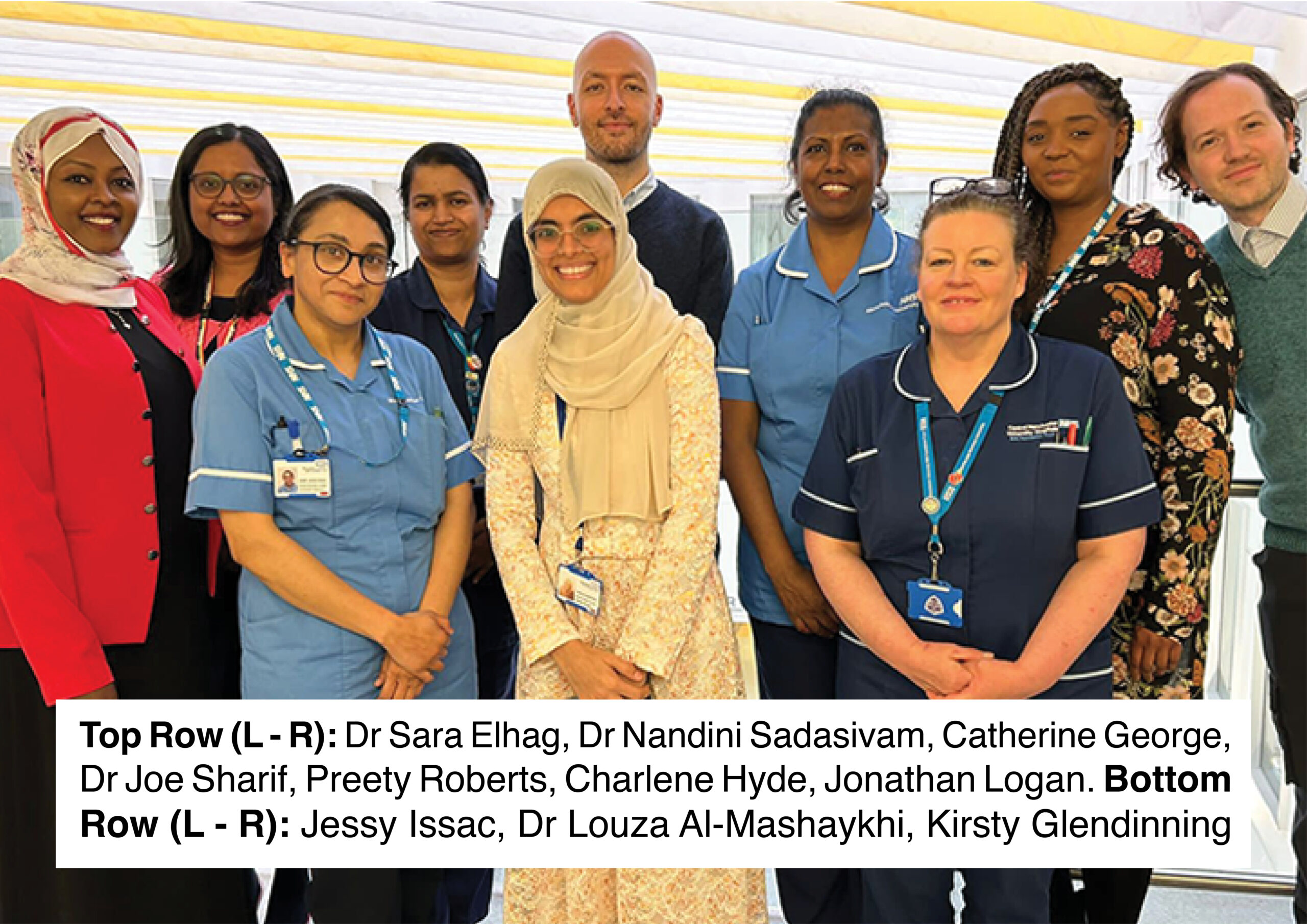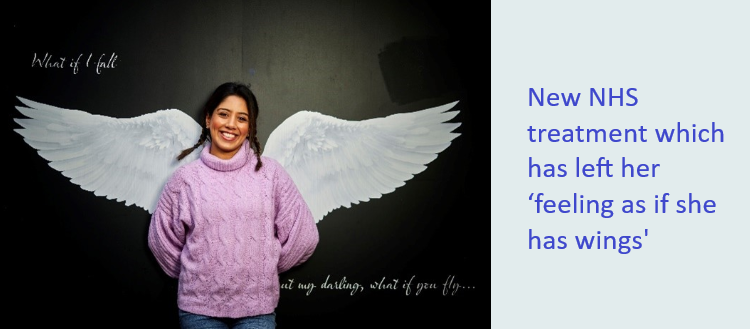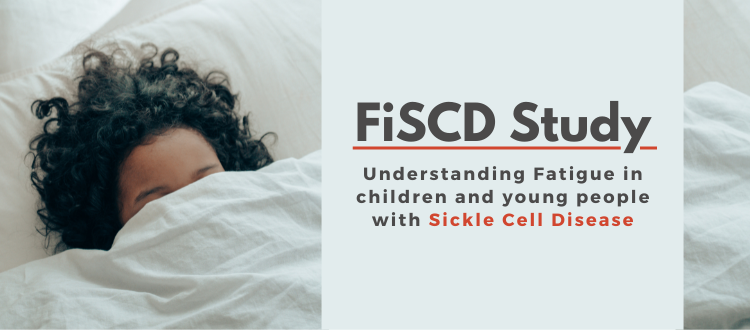This section of the HCC website focuses on research in to haemoglobinopathies. Research produces valuable knowledge for understanding human diseases/conditions, preventing, and treating illness and comorbidities, and promoting health.
Please note many of the clinical trials listed below will be located at Manchester University NHS Foundation Trust (MFT), as it is one of the key centres outside of London. Other trials, within the HCC, will have links to external websites (where the trial is being conducted).
Click on the links below or scroll down to articles:
Clinical trials and other research projects for sickle cell and thalassaemia patients
Taking part in research at MFT
Health and care research can only improve and save lives with the help of people like you. Clinical trials are carefully designed and conducted to minimise the risks and maximise the benefits to all who take part.
Taking part in research is a positive experience and entirely voluntary. Different studies and trials look for different people to take part, such as because of their age or aspects of the condition they are experiencing. Some explore new treatments, others seek to better understand how the conditions work. All health and social care research has to go through very strict ethical and regulatory checks before it can go ahead and participants to our research are very closely monitored throughout.
At MFT we have a number of research projects taking place to better understand and improve treatments for sickle cell and thalassaemia. We want to give people in Greater Manchester and beyond the opportunity to be part of our research.
Why Participate?
- Help advance medical understanding and treatment options.
- Contribute to research that directly benefits individuals with these conditions.
- Experience a carefully monitored and ethically approved research process.
About Sickle Cell and Thalassaemia:
- Sickle cell: An inherited condition affecting red blood cells, mainly affects people of African and Caribbean descent. Approximately 15,000 people in the UK have sickle cell.
- Thalassaemia: A group of inherited conditions impacting haemoglobin production. This condition mainly affects people of Mediterranean, south Asian, southeast Asian and Middle Eastern origin.
- For more information, visit the NHS England website on sickle cell and thalassaemia.
Get in touch to find out more
 If you would like more information or you are thinking of taking part in research in these areas, please contact the Clinical Trials team at MFT. Whether or not you take part in a study is always entirely up to you, but a member of the team will be happy to discuss our current studies with you.
If you would like more information or you are thinking of taking part in research in these areas, please contact the Clinical Trials team at MFT. Whether or not you take part in a study is always entirely up to you, but a member of the team will be happy to discuss our current studies with you.
Email: NMH.Trials@mft.nhs.uk
Telephone: 0161 276 6603 / 0161 906 7510
 (Updated March 2025)
(Updated March 2025)
Young Migrants, Chronic illness and Disability: The case of Children and young people with Sickle Cell Disease who migrate to the UK
Study Investigators:
Lead Chief Investigator – Dr Brenda Poku. Local Team – Dr Joseph Sharif & Dr John Grainger
Project Sponsor: University of Nottingham
What is the Purpose of the Study?
This study hopes to better understand the health and care experiences of children/young people (CYP) aged 16-24 living with Sickle Cell Disease who migrate to the UK and to identify ways of enhancing, improving and/or integrating health services to support their transition and integration post-migration.
What will happen if I take part?
Participants who decide to take part will be asked to take part in an interview for around 1.5 hours with Dr Brenda Poku either via video conferencing (Zoom/MS Teams/ WhatsApp) or telephone or in a public place.
The interview will focus on your day-to-day experiences with Sickle Cell Disease, how you cope with it, your healthcare experience and what might help you.
There is also the opportunity to participate in an art-based activity called photovoice. This activity will involve taking photographs that relate to your experiences and talking about them in a group setting with other migrant young people living with Sickle Cell Disease in England.
Expenses and Payments
To say ‘thank you’ for your time in taking part in the interview, the team will send you a £25 gift voucher at the end of the interview. They will also cover any out-of-pocket expenses such as travel expenses to the venue of the interview.
Further Information and Contact Details
If you would like to take part in the study or have questions, please get in touch with our Lead Investigator:
Dr Brenda Poku – Research Fellow
University of Nottingham
Telephone: 07974103283
Email: brenda.poku@nottingham.ac.uk
The REDRESS Study – Related Haplo-Donor Haematopoietic Stem Cell Transplantation for Adults with Severe Sickle Cell Disease
Study Investigators:
Dr Eleni Tholouli, Dr Farhan Ali Anjum, Dr Joseph Sharif, Dr Nandini Sadasivam & Dr Louza Al-Mashaykhi
Project Sponsor: Kings College Hospital
The REDRESS Study is a clinical trial researching the use of stem cell transplant (aka bone marrow transplant) to treat patients with Severe Sickle Cell Disease.
This study is being led by a group of Researchers based at Kings College London NHS Foundation Trust, University College London Hospitals NHS Foundation Trust and Guys & St Thomas’ NHS Foundation Trust.
What is the Purpose of the Study?
This study wants to determine whether stem cell transplant using Haplo-matched related donors are safe, effective and cost worthy in treating patients with sickle cell disorder compared with the standard of care treatment.
What will study participation involved?
120 people across the UK will be taking part in multiple sites across the UK. Each participant will be assigned to one of two groups at random decided at random. The first group is standard of care which is standard medical care currently available for SCD. The second is the Haplo-identical stem cell transplant group and will receive a stem cell transplant from a haplo-matched family donor.
There will be a number of study procedures and reviews which we will require to be completed as part of the study screening tests which will be scheduled at the same time as your normal hospital visits as much as possible. These results will determine whether you are suitable to take part.
More details can be found on the Study Information sheet.
Further Information and Contact Details
If you would like to take part in the study or have questions, please get in touch with our Research Team
The Principal Investigator:
Dr Eleni Tholouli & Dr Farhan Ali Anjum on 0161 276 8676
Or your Research Specialist Nurses
Marios Nikas (Stem Cell nurse) on 0161 276 4178
Cheetra Roberts (Sickle Cell Nurse) on 0161 906 7510
Now Recruiting For The Following:
Improving Black Health Outcomes (IBHO) & Genomics England Sickle Cell Initiative
Study Investigators
Dr Joseph Sharif, Dr Nandini Sadasivam & Dr Louza Al-Mashaykhi
Project Sponsor: Genomics England (NIHR)
Outline
Improving Black Health Outcomes (IBHO) Project & Research (NIHR) Bioresource Research Tissue Bank and the Diverse Data Initiative hope to get a better understanding of common physical and mental health disorders that affect people in Black communities including Sickle Cell Disease and Thalassaemia. This could help people get earlier and better treatment before developing more severe complications. Patients who have been diagnosed with Sickle Cell Disease and/or Thalassaemia from any ethnicity are invited to take part in this initiative so that findings from the research can benefit everyone and advance the understanding of both conditions.
Evaluation of the Urgent Care Sickle Cell Unit
Study Investigators
Dr Joseph Sharif, Dr Nandini Sadasivam & Dr Louza Al-Mashaykhi
Project Sponsor: The University of Manchester
Outline
Researchers from the University of Manchester are exploring the implementation of and experiences of patients who have attended the Urgent Emergency Care Unit (Ward 10).
They aim to understand your experiences of your care which you have received during your visit to the unit from the moment you engaged with the unit to discharge from hospital.
Natural History of Sickle Cell Disease Study
Study Investigators: Dr Joseph Sharif, Dr Nandini Sadasivam & Dr Louza Al-Mashaykhi
Project Sponsor: Guys and St Thomas’ NHS Foundation Trust
This study aims to set up a database of patients with Sickle Cell Disease to follow patients over a period of 5 years during routine care.
Adults with Sickle Cell Disease (SCD) may develop long-term complications of their SCD. Current treatment options for individuals with SCD are supportive care, blood transfusions or hydroxycarbamide (hydroxyurea). We currently only have limited information on how many adults will develop sickle-related complications and on the long-term outcomes of the available treatments. This limits the advice we are able to give you on your prognosis and on the best treatment options for you.
The Sickle Eye Project
Study Investigators: Dr Joseph Sharif as a local collaborator. Dr Marta Ugarte (Ophthalmologist) as PI
Project Sponsor: London North West University healthcare NHS Trust
The Sickle Eye Project: Prevalence of visual impairment due to sickle cell retinopathy and maculopathy in the United Kingdom
In this research study, they want to find out how common it is for people with sickle cell disease to have reduced vision due to the effects of sickle cell disease on their retina. Also want to know how the severity of sickle cell disease affects the chance of having reduced vision due to sickle cell disease. They also want to know how any reduction in vision affects quality of life. In addition, we want to know whether people with sickle cell disease will find regular eye scans acceptable to prevent sight loss.
The team will be approaching and identifying potential patients and will be working collaboratively with the Eye research team.
The GLADIOLUS Study
Study Investigators
Dr Nandini Sadasivam, Dr Joseph Sharif & Dr Louza Al-Mashaykhi
Project Sponsor: Forma Therapeutics, Inc.
Outline
The Gladiolus Study is a Clinical trial whose main purpose is to evaluate how safe and effective the study medication Etavopivat is on improving Haemoglobin levels, anaemia, and reducing the need of Red Blood Cell transfusion. The study is enrolling both Sickle Cell and Thalassaemia patients
This study is made up of 2 parts:
48 weeks of primary treatment with Etavopivat
60 weeks of optional extension treatment period
Thalassaemia (NOW CLOSED) & Sickle Cell (OPEN)
The RHEMEDY Study
Study Investigators: Dr Joseph Sharif, Dr Louza Al-Mashaykhi & Dr Nandini Sadasivam
Project Sponsor: CSL Behring
A Phase 2 / Phase 3, Multicenter, Randomized, Multiple-Dose, Double-Blind, Placebo-Controlled Adaptive Study to Evaluate the Safety, Efficacy and Pharmacokinetics of CSL889 in Adults and Adolescents with Sickle Cell Disease during Vaso-Occlusive Crisis.
The objective of the study is to first select the optimal dosing regimen for CSL889 in adults and adolescents with sickle cell disease (SCD) during vaso-occlusive crisis (VOC), and then to confirm the safety and efficacy of that dosing regimen. The study will be divided into 2 parts: Part A will correspond to phase 2 for dose selection, and Part B will correspond to phase 3 for safety/efficacy confirmation.
The FLORAL Study
Study Investigators: Dr Nandini Sadasivam, Dr Louza Al-Mashaykhi & Dr Sara Elhag
Project Sponsor: Novo Nordisk A/S
An open-label, multi-centre, rollover study to characterize long term safety and efficacy of Etavopivat in adults and children who have sickle cell disease or Thalassaemia and have completed a treatment period in an Etavopivat study.
HALO Study (Haematology Loved Experiences and Outcomes)
Study Investigators: Dr Joseph Sharif, Dr Nandini Sadasivam & Dr Fiona Dignan
Project Sponsor: University of Leeds
Health related quality of life and resource needs of survivors of leukaemia and life-threatening haematological disorders in young people.
Observational multicentre cohort study including 3 cohorts of patients based on their diagnosis including Sickle Cell Disease, β-Thalassaemia and Leukaemia covering the North of England.
Study will involve identifying patients using a range of data sources and will include data linkage and a participant survey
The INHERENT Study (International Haemoglobinopathy Research Network)
Study Investigators: Dr Joseph Sharif as lead for the UK
Project Sponsor: The Cyprus Institute of Neurology and Genetics (CING)
The International Hemoglobinopathy Research Network (INHERENT) is a recently established network that aims to study the role of genetic modifiers in hemoglobinopathies, through a large-scale, multi-ethnic genome-wide association study. INHERENT brings together nine existing international or regional consortia in the field of hemoglobinopathies, namely ITHANET, RADeep, ARISE, SPARCO, SADaCC, REDAC, the HVP Global Globin Network, the International Health Repository and the ClinGen Hemoglobinopathy VCEP. With a target sample size of 30,000 patients, this study aims to address challenges of previous studies related to small sample sizes and low statistical power, while promoting participation of diverse populations worldwide.
This study will run for at least 5 years and will be open to all individuals aged 2 years and over diagnosed with an inherited Haemoglobinopathy.
Voices of Change: Exploring Culturally –Responsive Pathways for Moving Young People from Paediatric to Adult Sickle Cell Services
Study Investigators: Dr Joseph Sharif & Dr Sabiha Kausar
This study has recently received funding for a collaborative project working together with the University of Manchester, The University of Nottingham as well as other organisations looking at the Pre, during and post transition experiences of young people aged 13-23 years old living with Sickle Cell Disease to better understand their experiences and needs as well as their families. This will help researchers to learn what tools and cultural considerations might help when they move from children’s to adult healthcare.
Planned opening date: Spring/Summer 2025
The RISE-UP Phase 3 Study
Study Investigators
Dr Joseph Sharif, Dr Nandini Sadasivam & Dr Louza Al-Mashaykhi
Project Sponsor: AGIOS Pharmaceuticals Inc.
Outline
The RISE UP study is a Phase 2 & Phase 3 double-blinded, randomised study which is to determine the effect of a new medication known as Mitapivat in participants with Sickle Cell Vs. Placebo.
The study is divided into 3 parts, Phase 2 (which is now completed), Phase 3 (now recruiting) and Open Label Extension.
For participants enrolled onto the Phase 3 study, they will be followed up for a total of 52 weeks including an up to 4-week screening period and double blind – treatment period over 10 visits and will be offered to continue on the Open Label phase of the study where they will receive the study medication Mitapivat.
The ENERGIZE Study
Study Investigators: Dr Nandini Sadasivam, Dr Louza Al-Mashaykhi & Dr Joseph Sharif
Project Sponsor: AGIOS Pharmaceuticals Inc.
Outline
ENERGIZE is a Phase 3, double blind, randomised study with the purpose of assessing whether Mitapivat helps to improve haemoglobin levels in non-transfusion-dependent Alpha- or Beta-thalassemia patients and whether it is safe.
Participants enrolled onto this study received either a dose of Mitapivat or placebo for a period of 24 weeks in the Double-blind period and after this had the option to continue to receive Mitapivat for an additional 5 years as part of the Open Label Extension.
TAPS 2 – Transfusion Antenatally in Pregnant Women with Sickle Cell Disease
Study Investigators: Dr Joseph Sharif
Project Sponsor: Guy’s and St Thomas’ NHS Foundation Trust
Outline
TAPS 2 is a randomised, two arm feasibility trial assessing whether pregnant women with Sickle Cell Disease would be willing to take part in a randomised controlled trial comparing Serial Prophylactic Exchange blood transfusion (SPEBT) to Standard of care.
Participants which were randomised to receive SPEBT completed this treatment from between 6- and 20-weeks’ gestation every 6-10 weeks until the end of pregnancy either in the haematology day unit or antenatal day units/wards in accordance with local practices.
The FiSCD Study – Fatigue in Children & Young People with Sickle Cell Disease
Study Investigators: Dr Joseph Sharif
Project Sponsor: The University of Manchester
Outline
Understanding fatigue experiences of children and young people with Sickle Cell Disease to guide the co-development of a fatigue self-management intervention.
This study was conducted by the Research Team at the University of Manchester, University of York, MFT and the Sickle Cell Society with the aim to better understand how children and young people with Sickle Cell Disease experience fatigue and how they can be supported. Participants were asked to complete an interview and Questionnaire with the Researcher of the Study – Dr Brenda Poku.
A short report of the study findings can be found on the Haemoglobinopathy webpage.
The RISE UP Phase 2 Study
Study Investigators: Dr Joseph Sharif, Dr Nandini Sadasivam & Dr Louza Al-Mashaykhi
Project Sponsor: AGIOS Pharmaceuticals Inc.
Outline
The RISE UP study is a Phase 2 & Phase 3 double-blinded, randomised study which is to determine the effect of a new medication known as Mitapivat in participants with Sickle Cell Disease Vs Placebo.
The study is divided into 3 parts, Phase 2 (which is now completed), Phase 3 (now recruiting) and Open Label Extension.
The IMR-BTL-201 Study & The IMR-SCD-301 Study
Study Investigators: Dr Joseph Sharif & Dr Nandini Sadasivam
Project Sponsor: IMARA Inc.
Outline
Phase 2 &2b studies evaluating a medication known as IMR-687 to treat participants with β-Thalassemia as well as Sickle Cell.
The purpose of these studies was to evaluate the how well IMR-687 is tolerated by both groups of patients, how safe it is and to establish what the medication does to red blood cells and other biomarkers associated with these diseases.
The ViSion Serenity Study
Study Investigators: Dr Joseph Sharif & Dr Nandini Sadasivam
Project Sponsor: Vifor International Inc.
Outline
A Phase 2a (assessing dose requirements), Double blind, randomised study investigating a new medication known as VIT-2763 or Vamifeport and its safety, tolerability and beneficial effects on two forms of Sickle Cell Disease – HbS/S and HbSβT0.
The ENERGIZE-T Study
Study Investigators: Dr Nandini Sadasivam
Project Sponsor: AGIOS Pharmaceuticals Inc.
Outline
ENERGIZE-T is a Clinical trial testing the study medication Mitapivat to see how safe and effective is for patients with Thalassaemia.
The trials’ main goal is to see whether Mitapivat decreases the need for transfusion and only included patients who require regular transfusions.
The CSL 889 Study
Study Investigators: Dr Joseph Sharif & Dr Nandini Sadasivam
Project Sponsor: CSL Behring
Outline
CSL889 is being developed for the treatment of the pain episodes (vaso-occlusive crisis or VOCs) experienced by patients with SCD. In patients with SCD, haem, a molecule that is released by red blood cells, is thought to be important in the development of a pain episode. Hemopexin is a protein that is produced naturally in the body, which normally mops up excess haem. In patients with SCD, levels of hemopexin are decreased.
CSL889 is a plasma-derived hemopexin that aims to correct this deficiency of hemopexin, thereby improving the symptoms of a pain episode.
The AGIOS 006 and 007 Study
Study Investigators: Dr Joseph Sharif & Dr Nandini Sadasivam
Project Sponsor: AGIOS Pharmaceuticals Inc
A Phase 3, Randomized, Double-Blind, Placebo-Controlled Study to Evaluate the Efficacy and Safety of AG-348 in Not Regularly Transfused Adult Subjects with Pyruvate Kinase Deficiency.
An Open-Label Study to Evaluate the Efficacy and Safety of AG-348 in Regularly Transfused Adult Subjects with Pyruvate Kinase (PK) Deficiency
You can find more research trials available in other locations through this link: Search Results | Beta ClinicalTrials.gov
News stories

A Mancunian woman revives her dream to visit the North Pole after receiving new NHS treatment for Sickle Cell.
In May 2022, Gloria started a new treatment at the Manchester Royal Infirmary that has significantly improved her quality of life and allowed her to revive her long-cherished dream. She said: “I’m one of those people who’s always open to trying new things to help myself and others it may benefit, like my brother, so I was excited to get started. I was just like – let’s do it! I didn’t even think twice.”
First in Europe to recruit patient to Sickle Cell Disease study
The adult non-malignant haematology research team at Manchester Royal Infirmary recruited the first patient in Europe to a study researching the effect of GBT440, in increasing red blood cells and reducing the severity of symptoms of sickle cell disease.

A Manchester woman, whose sickle cell condition was so painful she once thought it might end her life – has told of a new revolutionary NHS treatment which has left her ‘feeling as if she has wings.
Sanah Shaikh is one of the first patients in the UK to receive a Crizanlizumab. Sanah who is from Indian heritage, also hopes to help dispel a widespread myth about sickle cell – that it only affects people from Black or Afro-Caribbean backgrounds.
Useful links
Research and Innovation at MFT website
Manchester University NHS Foundation Trust website
Follow us on social media:
- Twitter: @MFT_Research
- Facebook: MFT Research and Innovation
- LinkedIn: @MFT Research and Innovation

Fatigue in Sickle Cell Disease Study funded by the National Institute for Health Research
This study (report in link below) looked at understanding fatigue in children and young people with sickle cell (SCD). The research team plan to use the findings to develop and evaluate a fatigue self-management programme. This will be done in collaboration with children/young people with SCD, adults with SCD, parents and care provider.
The FiSCD Study _Final Short Report
Study carried out by Dr Brenda Poku (University of Nottingham), Professor Susan Kirk (University of Manchester), Professor Karl Atkin (University of York), Dr John Grainger (Manchester NHS Foundation Trust) and Iyamide Thomas (Sickle Cell Society).
 In this section
In this section




